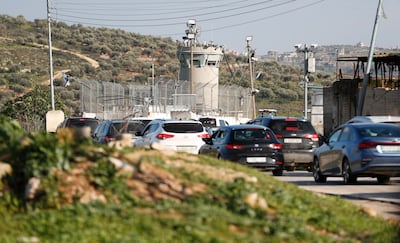Live updates: Follow the latest on Israel-Gaza
As the Jericho spring sunshine floods into his modern glass-walled office, estate agent Farid Khawaja walks towards what he calls the “master plan”, a large multicoloured map divided into hundreds of numbered plots.
“The yellow marks residential areas, pink is commercial and here are tourism and entertainment sections, all spread out over about 3,000 dunams [300 hectares] of desert,” he explains.
The different coloured sections come together to make Jericho Gate, one of the most ambitious real estate projects in the occupied Palestinian territories in years.
“In 2018, this place was only desert,” Mr Khawaja says. “We always used to have to send for a JCB to pull us out of the sand when we were driving around the site.”
The vast tract of land, about 250 metres below sea level and surrounded by arid mountains dotted with Israeli settlements, has transformed since then.
Modern villas, enclosed by high walls, elaborate electric gates and palm trees, line tidy streets interspersed with community gardens.
The average cost of these properties is about $500,000 and some have sold for about $1 million. Huge construction projects including malls and a market are under way near by.
The sudden creation of quiet, wealthy suburbia is a sign of how well things were going for Mr Khawaja and the team at Jericho Gate, despite all the hardship of doing business in the occupied West Bank.
Sixty-four per cent of the project’s land has been sold to developers and about 70 per cent of that is either constructed or under construction.
Then came the Gaza war, after which Israel imposed continuing draconian measures on the West Bank, which it fears could become a second front in the conflict.
Mr Khawaja has not sold a single plot of land in the more than four months since war broke out.
“Many people are planning to give up their contracts with us,” he says. “We keep negotiating and so far no one has, but it’s not easy. I’ve had to slow down construction of infrastructure and I might even have to stop entirely at some point.

“Across the board, we’ve seen a 70 per cent slowdown in construction.”
The precipitous drop in economic activity is common across the West Bank. Israeli checkpoints, settler violence and a ban on blue-collar workers crossing the border into Israel for jobs is taking a toll.
Samir Hulileh, Jericho Gate’s primary developer, says the main problem in the region today is the “complete closure of cities”.
“You simply cannot move,” says Mr Hulileh. “The West Bank economy was mobilised by the 200,000 Palestinian workers in Israel who monthly brought the largest sum of cash into the area. Then there were the disproportionately richer Arab Israelis who used to invest and shop in the West Bank.”
Workers bear the biggest economic cost of the restrictions.
Mr Khawaja, who lives in Nablus, had just spent two hours in a checkpoint to leave the northern West Bank city.
He estimates that Jericho Gate provides as many as 15,000 jobs, through direct and indirect employment. Most of those workers come from other cities.

“For the last four months, we have not had a functioning day of labour,” Mr Hulileh says.
“I have to admit that we were a bit hopeful when Gazan workers in Israel on October 7 were captured by Israel and transferred to the West Bank cities. We thought we could use them. They are skilled and very good at what they do. Then Israel took them back into Gaza.”
Mr Hulileh fears the Israeli government, the most right wing in the country’s history, is determined to use its grip on the Palestinian economy as a means to tip the West Bank into anarchy and violence.
“With the experience of recent decades, even a simple Israeli army officer understands that this economic situation a formula for disaster,” he says. “It appears that Israel is looking for violence.”
Israeli economist David Rosenberg agrees. “People who are impoverished are going to do something about it. There aren’t too many outlets for free expression in the West Bank," he warns. "One of them is pick up a gun.”
“The right, to whom [Israeli Prime Minister Benjamin Netanyahu] is entirely beholden, is using the Gaza war to pursue an agenda in the West Bank.
“Financial collapse could end the Palestinian Authority. If there’s no PA, and there’s a risk of that no matter what happens because it’s collapsing internally without Israel doing much to push it, then we’ll have to return to some kind of Israeli military rule, putting us halfway to annexation of the entire West Bank.”
Mr Hulileh’s frustration is palpable. Jericho was a rare beacon of Palestinian economic hope.
“The economy in the West Bank was growing by to 2.5 to 3.5 per cent before October 7. It wasn’t much but it was still functioning and trying to recover from Covid-19 and other problems,” Mr Hulileh says.
“Jericho, however, was exceptional, because of its weather and central location: it is the only winter palace for the West Bank.”

More than two million foreign tourists visited Jericho in 2022 and its popularity is quickly rivalling Bethlehem. One of the oldest inhabited places on Earth, the Tell es-Sultan area of Jericho was last year listed as a world heritage site by Unesco.
Mr Khawaja is trying to stay optimistic. “Jericho is still a virgin market, compared to somewhere like Ramallah or Bethlehem, where there are hundreds of restaurants and hotels,” he says.
“I’m making my career here. I left Palestine after university and started work in the UAE to get experience, but every Palestinian knows they have to come back at some point, no matter the cost.
“It’s a rule in the West Bank: every 10, maximum 20 years, there will be a war, that we’ll go to the bottom. But once you hit the bottom you have to come up again.”


